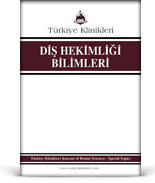Amaç: Bu kesitsel çalışmanın amacı; diş eksikliği olan erişkin hastaların diş eksikliği şiddetinin ağız sağlığı ile ilişkili yaşam kalitesi [oral health-related quality of life (OHRQoL)] üzerine etkisinin değerlendirilmesidir. Gereç ve Yöntemler: Bu çalışmaya hastaneye başvuran 255 hastadan, 18 yaşından büyük ve en az 1 diş eksikliği bulunan 158 gönüllü hasta dâhil edildi. Hastaların yaş, cinsiyet, eğitim durumu gibi sosyodemografik verileri, ağız sağlığı alışkanlıkları, eksik diş sayıları ve kendi değerlendirdikleri yaşam kalitesi verileri kaydedildi ve sınıflandırıldı. Diş kaybının OHRQoL üzerindeki etkisi, Likert tipi bir ölçek ile hasta tarafından skorlanan 14 maddelik ağız sağlığı etki profili [oral health impact profile (OHIP-14-TR)] anketinin Türkçe versiyonu kullanılarak değerlendirildi. Bulgular: Eksik diş sayısına göre OHIP-14 toplam puanları arasında istatistiksel olarak anlamlı bir farklılık bulunmuştur (p=0,001). Burada farklılık 1-3 eksiği olanlar ile 10 ve 10'dan fazla eksiği olanlar arasında görülmüştür. 1-3 diş eksiği olanlarda OHIP-14 genel puanı ortanca değeri 16, 4-6 eksiği olanlarda 18, 7-9 eksiği olanlarda 17 ve 10 ve 10+ diş eksiği olanlarda bu değer 29 olarak elde edilmiştir. Hastaların, yaş, medeni durum, çalışma durumu, diş fırçalama sıklığı ve diş hekimi ziyareti sıklığı değişkenleri arasında istatistiksel olarak anlamlı farklar elde edilmiştir (p=0,001). Sonuç: Çalışmanın sınırlamaları dâhilinde diş kaybının hastaların OHRQoL'si üzerinde olumsuz bir etkisi olduğu gösterilmiştir. Diş kaybının şiddeti arttıkça, OHIP-14 puanı artmaktadır. Diş kaybı olan hastalarda, fiziksel, psikolojik ve sosyal kısıtlılıklar görülmektedir.
Anahtar Kelimeler: Diş kaybı; ağız sağlığı; yaşam kalitesi
Objective: The aim of this cross-sectional study was to evaluate the effect of tooth loss severity on oral health-related quality of life (OHRQoL) in adult patients with missing teeth. Material and Methods: Among 255 patients admitted to the hospital, 158 volunteer patients over 18 years of age and with at least one missing tooth were included in this study. Sociodemographic data such as age, sex, education status, also oral health habits, number of missing teeth and selfevaluated quality of life data of the patients were recorded and classified. The effect of tooth loss on OHRQoL was evaluated using the Turkish version of the 14-item oral health impact profile (OHIP14-TR) questionnaire scored by the patient with a Likert-type scale. Results: A statistically significant difference was found between the OHIP-14 total scores according to the number of missing teeth (p=0.001). The difference was seen between those with 1-3 deficiencies and those with 10 and more than 10 deficiencies. The median OHIP-14 overall score was 16 in those with 1-3 missing teeth, 18 in those with 4-6 missing, 17 and 10 in those with 7-9 missing, and 29 in those with 10+ teeth. Statistically significant differences were obtained between the variables of age, marital status, employment status, frequency of tooth brushing and frequency of dental visits (p=0.001). Conclusion: Within the limitations of the study, tooth loss has been shown to have a negative impact on patients' OHRQoL. As the severity of tooth loss increases, the OHIP-14 score increases. Physical, psychological and social limitations are seen in patients with tooth loss.
Keywords: Tooth loss; oral health; life quality
- Anbarserri NM, Ismail KM, Anbarserri H, Alanazi D, AlSaffan AD, Baseer MA, et al. Impact of severity of tooth loss on oral-health-related quality of life among dental patients. J Family Med Prim Care. 2020;9(1):187-91. [Crossref] [PubMed] [PMC]
- Kimmie-Dhansay F, Pontes CC, Chikte UME, Chinhenzva A, Erasmus RT, Kengne AP, et al. Impacts of tooth loss on OHRQoL in an adult population in cape town, South Africa. Int J Environ Res Public Health. 2021;18(9):4989. [Crossref] [PubMed] [PMC]
- Petersen PE, Yamamoto T. Improving the oral health of older people: the approach of the WHO Global Oral Health Programme. Community Dent Oral Epidemiol. 2005;33(2):81-92. [Crossref] [PubMed]
- Yoshihara A, Suwama K, Miyamoto A, Watanabe R, Ogawa H. Diet and root surface caries in a cohort of older Japanese. Community Dent Oral Epidemiol. 2021;49(3):301-8. [Crossref] [PubMed]
- Kateeb E, Momany E. Dental caries experience and associated risk indicators among Palestinian pregnant women in the Jerusalem area: a cross-sectional study. BMC Oral Health. 2018;18(1):170. [Crossref] [PubMed] [PMC]
- Hariyani N, Spencer AJ, Luzzi L, Do LG. Root caries experience among Australian adults. Gerodontology. 2017;34(3):365-76. [Crossref] [PubMed]
- Chaffee BW, Rodrigues PH, Kramer PF, Vítolo MR, Feldens CA. Oral health-related quality-of-life scores differ by socioeconomic status and caries experience. Community Dent Oral Epidemiol. 2017;45(3):216-24. [Crossref] [PubMed] [PMC]
- Spanemberg JC, Cardoso JA, Slob EMGB, López-López J. Quality of life related to oral health and its impact in adults. J Stomatol Oral Maxillofac Surg. 2019;120(3):234-9. [Crossref] [PubMed]
- Başol ME, Karaağaçlıoğlu L, Yılmaz B. Türkçe ağız sağlığı etki ölçeğinin geliştirilmesi-OHIP-14-TR [Developing a Turkish oral health impact profile-OHIP-14-TR]. Turkiye Klinikleri J Dental Sci. 2014;20(2):85-92. [Link]
- Gerritsen AE, Allen PF, Witter DJ, Bronkhorst EM, Creugers NH. Tooth loss and oral health-related quality of life: a systematic review and meta-analysis. Health Qual Life Outcomes. 2010;8:126. [Crossref] [PubMed] [PMC]
- Pereira D, Machado V, Botelho J, Proença L, Rua J, Lemos C, et al. Impact of malocclusion, tooth loss and oral hygiene habits on quality of life in orthodontic patients: a cross-sectional study. Int J Environ Res Public Health. 2021;18(13):7145. [Crossref] [PubMed] [PMC]
- Çelik İnce S, Günüşen N. Kronik ruhsal hastalığı olan bireylerin ağız ve diş sağlığı ile ilişkili yaşam kalitesinin ve alışkanlıklarının değerlendirilmesi [Assessment of oral and dental health habits and quality of life of individuals with severe mental illnesses]. DEUHFED. 2022;15(3):328-339. [Link]
- Hegarty AM, McGrath C, Hodgson TA, Porter SR. Patient-centred outcome measures in oral medicine: are they valid and reliable? Int J Oral Maxillofac Surg. 2002;31(6):670-4. [Crossref] [PubMed]
- John MT, Hujoel P, Miglioretti DL, LeResche L, Koepsell TD, Micheelis W. Dimensions of oral-health-related quality of life. J Dent Res. 2004;83(12):956-60. [Crossref] [PubMed]
- Batista MJ, Lawrence HP, de Sousa Mda L. Impact of tooth loss related to number and position on oral health quality of life among adults. Health Qual Life Outcomes. 2014;12:165. [Crossref] [PubMed] [PMC]
- Ebersole JL, D'Souza R, Gordon S, Fox CH. Oral health disparities and the future face of America. J Dent Res. 2012;91(11):997-1002. [Crossref] [PubMed]







.: İşlem Listesi